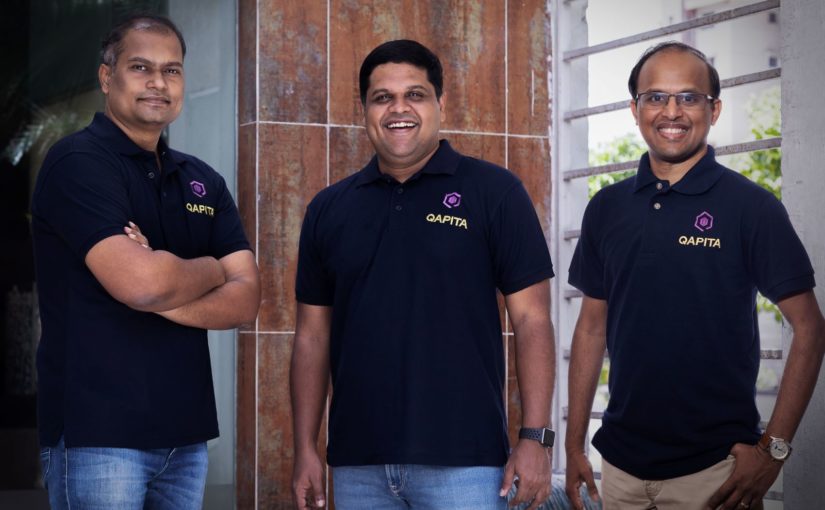Singapore-based legaltech startup Qapita announced $15 million (over 213 billion Rupiah) series A funding led by East Ventures through Growth Fund and Vulcan Capital. Participated also in this round NYCA and previous investors, including MassMutual Ventures, Endiya Partners, and several angel investors, including Alto Partners, partners from Northstar Group and K3 Ventures.
Previously, Qapita raised $5 million in the Pre-Series A round and $2.25 million in the seed round, respectively in April 2021 and September 2020. The company has raised a total of $22.25 billion in funding since it was founded.
Qapita is a legaltech company that helps private companies such as startups to manage company’s record of share ownership structures (known as capital tabulations/cap tables) and employee share ownership plans (ESOPs). The startup was founded in September 2019 by CEO Ravi Ravulaparthi, COO Lakshman Gupta, and CTO Vamsee Mohan.
The three of them saw an opportunity to digitize and make the private capital market more efficient. The founders come from diverse professional backgrounds with more than 20 years of experience working as bankers, investors and technologists in South and Southeast Asia.
Qapita’s Co-founder & CEO, Ravi Ravulaparthi explained that the fresh funds will be used to expand its operations in Indonesia, including to strengthen its client base in Singapore and India. He said, Indonesia is one of the fastest growing private markets in the world. It is now a good time to build operating systems and transaction rails for private enterprise ownership in the region.
“It is related to the use of technology to increase transparency, access, efficiency, and liquidity in the private market. This platform will also empower Indonesian startup employees in terms of company ownership. The Qapita team is very grateful to our shareholders and partners in Indonesia who have supported this effort,” Ravulaparthi said in an official statement, Wednesday (6/10).
The Qapita team has grown from 7 people, twelve months ago to around 65 people, today in Singapore and India. Qapita’s operational scope is now spread across three countries, India, Indonesia and Singapore.
The reason is said that these three areas have companies identify opportunities to use technology as it gathers three main trends. It includes the rapid growth in various startups, the expansion of several venture capital, and the financial digitalization.
Qapita predicts the private securities value in the region will exceed $1 trillion-$1.5 trillion (with 200-250 unicorns) in the next few years and scalable digital solutions will be critical for the ecosystem to thrive. Qapita equity management software solves problems related to HR (ESOP), finance and fundraising issues for private companies, investors, shareholders and employees.
Qapita’s marketplace enables secondary transactions for stakeholders. Qapita estimates that more than USD 150 billion of equity will require various liquidity solutions.
Ravulaparthi continued, the company plans to add more products to its platform with this funding round, not only to provide solutions for private companies and startups, but also investors, shareholders and employees.
“Qapita also plans to facilitate liquidity solutions through digital marketplaces that enable transactions for companies between their investors and employee stakeholders.”
East Ventures’ Co-founder & Managing Partner, Willson Cuaca stated his enthusiasm to invest more in Qapita to build an operating system for the private market in the region. “Qapita can be a liaison network between private companies, their employees, shareholders and investors in all matters relating to equities. The startup ecosystem in Indonesia and other regions is growing rapidly,” he said.
ESOP trend in Indonesia
Casting for skilled talent is an important task for startups, but retaining talented staff is another big challenge. High salaries and benefits are the traditional way to retain talent. However, this strategy does not always work, especially when the startup faces competition from other, bigger and more established startups.
In the ESOP, the employer allocates a varying number of company shares to each qualified employee, depending on the salary scale or other aspects. ESOPs usually come with a vesting period, during which employees are prohibited from selling shares.
Each employee’s stock is held in the company’s ESOP trust until the employee retires, leaves the company, or is allowed to sell their shares. Once fully entitled, the company can “buy back” shares from employees, either in its entirety or periodically through liquidity or buybacks.
The plan was created to increase employees dedication to achieve positive results for the startup, as the value of their shares will increase along with the value of the company. By owning shares in the company, employees are less likely to leave, thus potentially reducing employee turnover rates for startups.
The ESOP is becoming a method that is being used gradually in Southeast Asia for small startups to attract and retain talent. In Indonesia, on Ravulaparthi’s observation, this concept is just getting popular. While in India, it has been implemented since the last three years.
A joint survey conducted by Monk’s Hill Ventures and recruitment platform Glints found that in Southeast Asia, equality is a common compensation for C-level staff and other executive-level employees, yet not limited to junior or mid-level employees. The survey stated that less than 32% of participants were compensated in the form of equity. The preference for cash payments is the main reason for the low proportion.
–
Original article is in Indonesian, translated by Kristin Siagian
